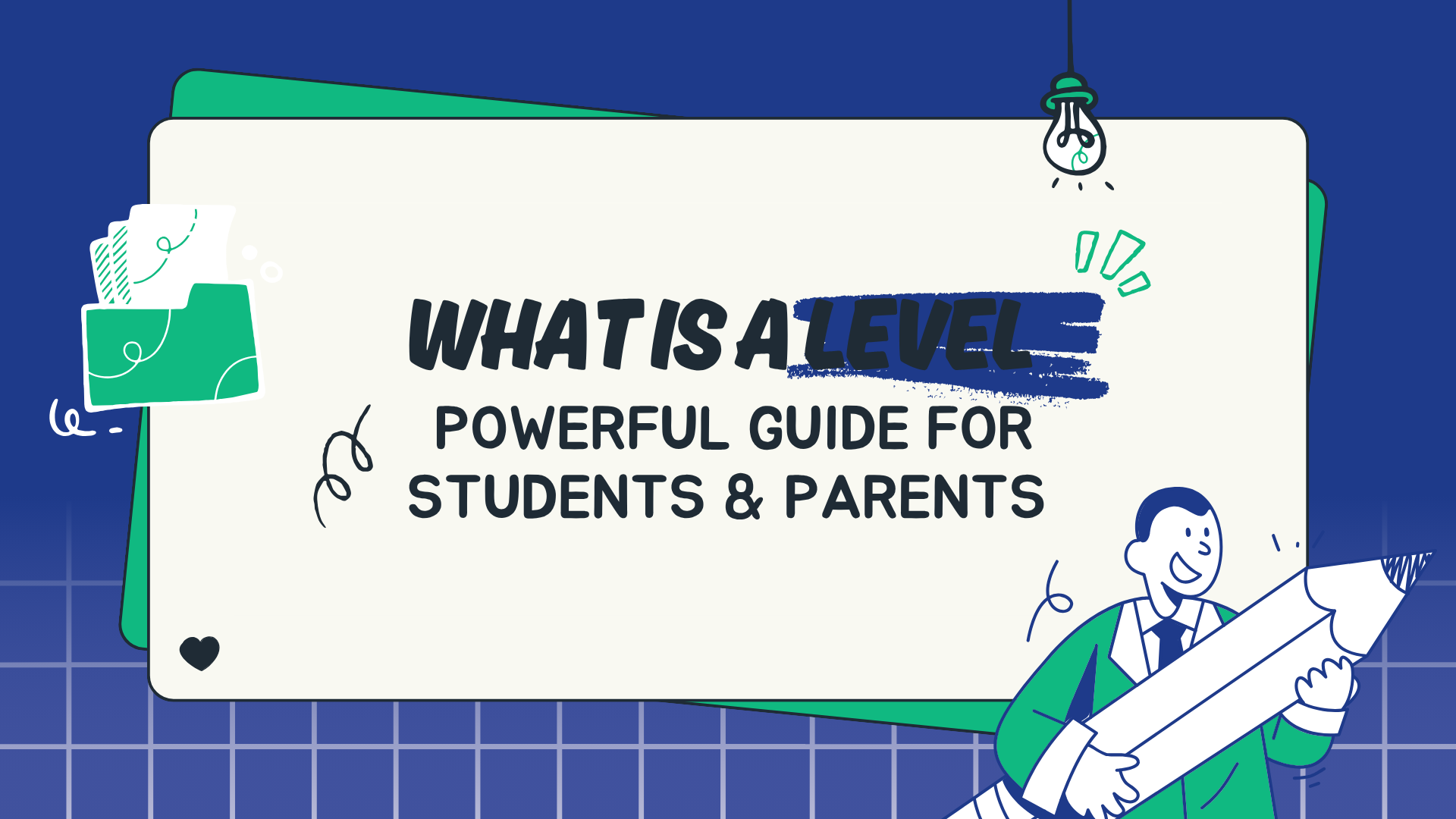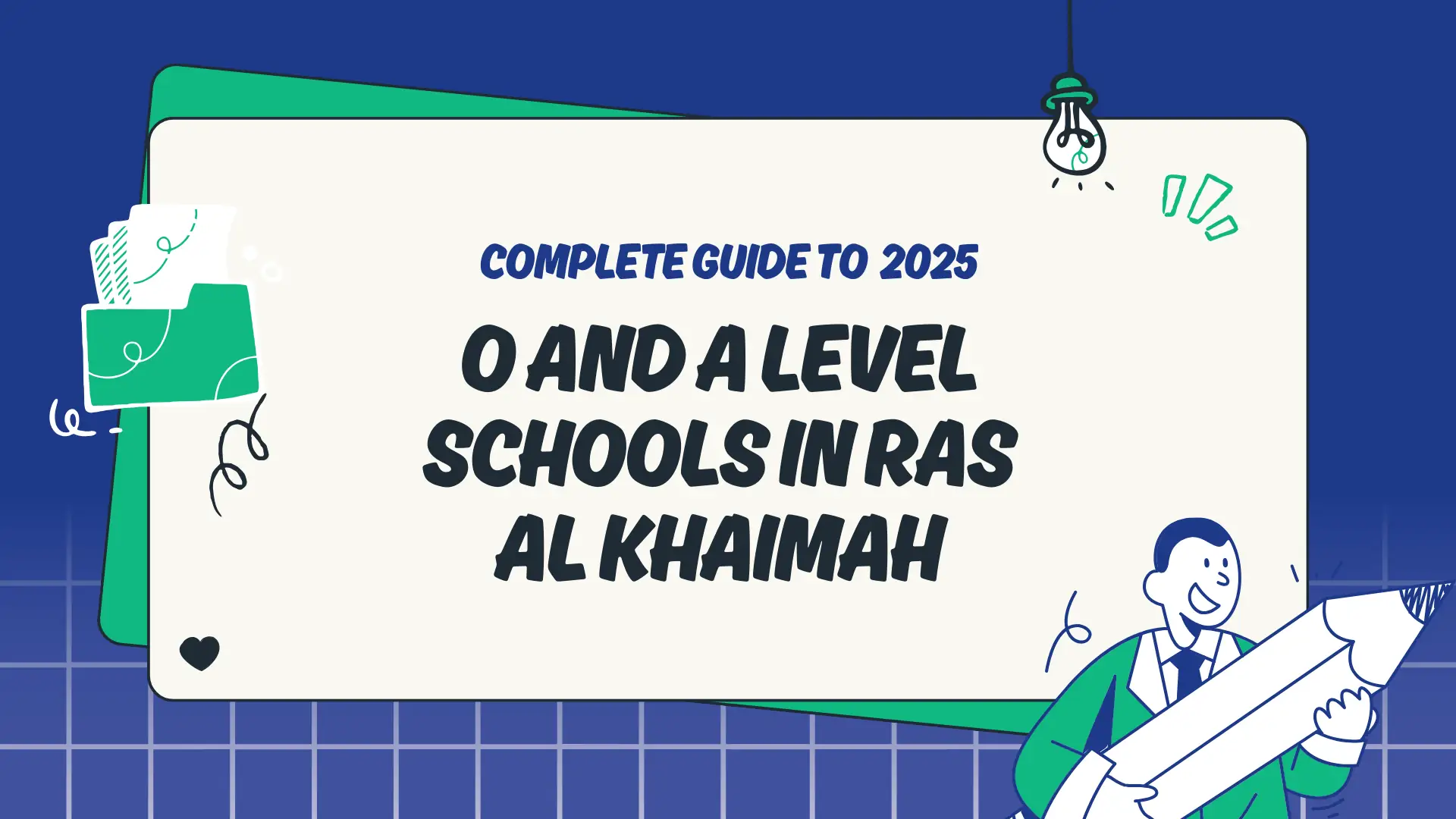A Level, short for Advanced Level, is a globally recognized academic qualification offered by the Cambridge Assessment International Education and other examination boards such as Edexcel and OCR. It is typically pursued by students between the ages of 16 and 19 after completing their O Level or equivalent secondary education.
A Level programs are known for their in-depth focus on specific subjects, offering students the flexibility to specialize in the areas of their interest. This level of education is widely accepted by universities and employers worldwide, making it a preferred choice for students aiming for higher education abroad or in competitive local institutions.
A Levels are part of the General Certificate of Education (GCE) system. They are commonly studied over two years, AS Level (first year) and A2 Level (second year), which comprise the complete A Level qualification.
Curious about what is A Level? Learn how this program opens doors to top universities and future success in our simple, powerful guide.
History and Background of A Levels

The A Level system was first introduced in the United Kingdom in 1951 as part of the General Certificate of Education (GCE). Its purpose was to provide a more advanced qualification for students who had completed their secondary education and were preparing for university-level studies.
Originally, students would take O Levels at around age 16, followed by A Levels at age 18. Over time, the A Level structure evolved into a two-part qualification: the AS Level (Advanced Subsidiary) and the A2 Level, each typically studied over one academic year.
With the growing popularity of British-style education worldwide, A Levels were adopted internationally. Today, the qualification is offered in over 130 countries, and millions of students take A Level exams every year.
In countries like Pakistan, India, Singapore, and the United Arab Emirates, A Levels have become a popular alternative to local higher secondary education systems, such as FSc, HSC, or Intermediate.
The consistent academic rigor and global recognition of A Levels make them a strong foundation for university admissions and future career opportunities.
A Level Curriculum and Subject Choices
One of the key strengths of the A Level system is the flexibility it offers in subject selection. Unlike traditional education systems that often require students to follow a fixed curriculum, A Levels allow students to choose subjects based on their interests, career goals, and university requirements.
Subject Groups
A Level subjects are broadly categorized into the following groups:
- Sciences: Physics, Chemistry, Biology, Mathematics, Computer Science
- Commerce & Business: Accounting, Business Studies, Economics
- Humanities & Social Sciences: Sociology, Psychology, History, Geography
- Languages & Arts: English Literature, Urdu, Law, Art & Design
Number of Subjects
Typically, students select 3 to 4 subjects for A Levels, depending on their academic strengths and the requirements of the universities they aim to apply to. Some students take additional subjects to enhance their academic profiles, though it’s not mandatory.
AS and A2 Levels
The A Level program is divided into two stages:
- AS Level (Advanced Subsidiary): Taken in the first year; it counts as 50% of the final A Level grade.
- A2 Level: Taken in the second year; it completes the A Level qualification and contributes the remaining 50%.
Students can choose to complete just the AS Level for each subject or go on to complete the full A Level qualification by taking both AS and A2 exams.
Flexibility and Depth
This structure provides an opportunity for students to dive deep into subjects of their choice, building strong foundational knowledge that helps them in higher education, particularly in specialized fields such as engineering, medicine, law, or finance.
Grading System in A Levels
The A Level grading system plays a crucial role in determining a student’s eligibility for university admissions and scholarships. It evaluates students’ analytical skills, subject knowledge, and exam performance through a standardized and internationally recognized scale. Unlike some systems where internal assessment dominates, A Levels rely heavily on external examinations, ensuring consistency and fairness.
Grade Scale Overview
A Level results are reported using letter grades, each representing a specific band of performance. These grades include:
- A*: Awarded for exceptional performance, usually above 90% overall. This grade shows the highest level of achievement.
- A: Indicates excellent understanding and application of the subject material.
- B: Represents a very good performance and strong comprehension.
- C: Considered a good pass, suitable for many university courses.
- D: A satisfactory performance, but not as competitive for top institutions.
- E: The minimum passing grade; still considered a pass.
- U (Ungraded): Indicates that the candidate did not meet the minimum criteria required for a grade.
A* is only awarded at the full A Level stage (not at AS Level) and signifies outstanding academic excellence.
AS vs A2 Level Grading
- AS Level (Advanced Subsidiary): Graded from A to E. It makes up 50% of the final A Level score and is usually taken in the first year.
- A2 Level: Taken in the second year and completes the full A Level. The grades from AS and A2 are combined to determine the final A Level result.
Students who wish to complete only the AS Level qualification can do so, and it is often accepted for certain university programs, especially in the UK and Commonwealth countries.
Percentage Uniform Mark (PUM) System
In addition to letter grades, students also receive a Percentage Uniform Mark (PUM), which provides further insight into how well they performed within their grade. The PUM helps distinguish between students who may have the same letter grade but different numerical scores.
Here’s how PUM typically maps to grades:
- 90–100% = A*
- 80–89% = A
- 70–79% = B
- 60–69% = C
- 50–59% = D
- 40–49% = E
- Below 40% = U (Ungraded)
This percentage system is especially useful for universities during competitive admissions processes, as it allows them to assess not just what grade a student achieved, but how strong their performance was within that grade.
Importance of Grades in University Admissions
A Level grades are critical for university applications, especially in countries like the UK, Australia, Canada, and even Pakistan. Top-tier universities often require at least A and B grades in relevant subjects. Competitive programs like medicine, engineering, law, and finance usually expect straight A’s or a combination of A* and A grades.
In addition, strong A Level grades can lead to:
- Scholarships and financial aid
- Advanced placement in university courses
- Better job opportunities for early-career roles
These are the importance of grades in Universities.
A Level vs O Level vs Other Systems (FSc, IB, etc.)

When students complete their secondary education, they often face the challenge of choosing the right path for higher studies. Among the popular options available globally and in countries like Pakistan are A Levels, O Levels, FSc (Intermediate), and the International Baccalaureate (IB). Each of these systems offers distinct features, and understanding the differences can help students make informed decisions.
Difference Between A Level and O Level
O Level, or Ordinary Level, is typically taken by students in Grades 9 and 10. It covers a wide range of subjects at a foundational level and is designed to prepare students for advanced studies. A Level, or Advanced Level, follows O Level and is generally taken in Grades 11 and 12. It allows students to specialize in fewer subjects, usually three or four, offering in-depth knowledge and analytical training. While O Level focuses more on breadth, A Level emphasizes depth and is intended to prepare students for university-level education.
A Level vs FSc (Intermediate System in Pakistan)
FSc is a national system in Pakistan, divided into streams like Pre-Medical, Pre-Engineering, and ICS. Students follow a fixed combination of subjects based on their chosen field. In contrast, A Level provides greater flexibility, allowing students to choose any combination of subjects based on their interests and career goals. A Levels are taught in English and are more concept-based, while FSc is often based on memorization and theoretical learning. Though FSc is more affordable and recognized by local universities, A Levels are internationally recognized and open doors to universities abroad.
A Level vs IB (International Baccalaureate)
The International Baccalaureate (IB) is another global qualification, known for its holistic approach to education. While A Levels let students specialize in specific subjects, the IB program requires students to study six subjects from different groups, along with core components like the Extended Essay, Theory of Knowledge (TOK), and Creativity, Activity, Service (CAS). The IB is more structured and intensive, whereas A Levels offer more academic freedom and subject focus. Both are accepted by international universities, but the IB is often seen as more demanding in terms of workload and time commitment.
Why Students Choose A Levels?
Many students prefer A Levels because of their academic flexibility, global recognition, and strong preparation for university education. The system suits students who have clear career goals and want to focus deeply on specific subjects. It also promotes analytical thinking, problem-solving, and independent learning, which are essential for success in higher education and professional life.
Advantages of A Level Education

A Level education is widely regarded as one of the most reputable and academically rigorous qualifications available to students after secondary school. Whether you plan to pursue higher education locally or internationally, A Levels offer a variety of benefits that make them a top choice for ambitious students.
1. International Recognition
A Levels are accepted by universities and colleges across the world, including in the UK, USA, Canada, Australia, and many parts of Europe and Asia. Top institutions, including the Ivy League and the Russell Group, recognize A Levels as a high-standard academic qualification, making it easier for students to apply for competitive programs abroad.
2. Flexibility in Subject Choice
Unlike systems with fixed subject combinations, A Levels allow students to select subjects based on their interests and future career goals. Whether you’re aiming for medicine, engineering, business, law, or the arts, you can tailor your subject combination to match your desired university course or profession.
3. In-depth Subject Knowledge
A Levels are known for their depth rather than breadth. This allows students to focus intensely on a few subjects, giving them a deeper understanding and better preparation for university-level study. This kind of focused learning also builds a strong academic foundation in specific areas.
4. Skill Development
Through A Level studies, students develop essential academic and personal skills such as critical thinking, research skills, analytical reasoning, essay writing, and time management. These skills are not only beneficial for higher studies but also prepare students for the demands of the modern workplace.
5. Better University Preparation
A Level students are often more prepared for the style of learning required at university. They are familiar with independent study, essay-based assessments, and research tasks. As a result, A Level graduates tend to adjust more easily to university environments compared to students from more rigid or theory-based systems.
6. Wide Range of Subjects
A Levels offer a broad range of subjects, from sciences and mathematics to humanities, arts, and business. This variety ensures that students can pursue their interests while keeping their options open for multiple career paths.
7. Pathway to Scholarships
Excellent A Level results can open the door to scholarships and financial aid from universities, especially in the UK and other Western countries. Many institutions offer merit-based scholarships to A Level students based on their grades and academic performance.
8. Opportunities for Career Advancement
In many professional fields, employers value the critical thinking and subject expertise that A Level students bring. Even if a student chooses not to pursue higher education immediately, A Level qualifications are respected by employers worldwide.
Challenges of A Level Education

While A Level education offers numerous advantages, it also comes with its own set of challenges. Prospective A Level students need to be aware of these challenges to prepare themselves for the academic rigor and commitment the program demands.
1. Heavy Workload and Pressure
A Levels require a significant amount of independent study, and students are expected to master complex topics in a short amount of time. The workload can be intense, especially when balancing multiple subjects, and the pressure to perform well in exams can be overwhelming. This may lead to stress, particularly during exam periods.
2. Limited Subject Choices
While A Levels offer flexibility in choosing subjects, students typically select only 3 to 4 subjects. This means that those with diverse interests may find it challenging to cover all the areas they are passionate about. For example, students interested in both the sciences and humanities may have to make tough choices and focus on only one stream.
3. High Costs
A Level education, especially at private institutions, can be costly. Tuition fees, exam registration fees, and the cost of textbooks, study materials, and extra tutoring can add up quickly. The overall cost of pursuing A Levels, especially for international students, may be a barrier for some families.
4. Risk of Specialization Too Early
Since A Levels focus heavily on a few subjects, students might feel pressured to specialize in a particular field early in their academic careers. This can be challenging for those who are still exploring their career options and may not have a clear direction. The limited range of subjects may also narrow students’ options, making it difficult to switch to different academic paths.
5. Rote Learning Culture (for Some Subjects)
While A Levels are generally known for promoting independent learning and critical thinking, some subjects may still be more exam-focused and emphasize memorization over practical application. This can be particularly true for subjects like history, where students may need to memorize dates, events, and facts.
6. Emotional and Mental Strain
The pressure to perform well in A Levels can take a toll on students’ mental health. The fear of failure and the constant drive to achieve top grades can lead to burnout, anxiety, and depression. Students must manage stress effectively and seek support when needed.
7. Uncertainty in University Admissions
While A Levels are widely recognized, some students may face uncertainty during the university admission process. The competitiveness of some programs, especially at top-tier universities, means that even students with excellent A Level results may not be guaranteed a place. Students may need to deal with waiting lists or reapplications, adding to the pressure.
How to Prepare for A Level Exams

Preparing for A Level exams requires dedication, strategic planning, and effective study habits. The intensity of the coursework combined with the high stakes of the exams means that students must be proactive and well-organized to succeed. Here are some essential tips and strategies for effective preparation:
1. Start Early and Plan Ahead
One of the keys to success in A Levels is starting your preparation early. Begin reviewing material well before the exam period to avoid last-minute cramming. A structured study plan is essential. Break down your syllabus into manageable sections, and allocate time each week to review different topics. This approach allows you to stay on top of the material and reduces stress as exams approach.
2. Focus on Understanding, Not Memorization
A Level exams often test a deeper understanding of concepts, so it’s important to focus on conceptual clarity rather than rote memorization. Spend time grasping the underlying principles behind the topics and practice applying these concepts to different scenarios. This approach will help you solve complex problems during exams and write analytical answers.
3. Practice Past Papers
Practicing past exam papers is one of the most effective ways to prepare for A Level exams. It helps familiarize you with the exam format, the types of questions asked, and the level of difficulty. It also allows you to manage your time more effectively, as you can simulate exam conditions. Pay attention to the areas that are frequently tested and identify patterns in the types of questions that come up.
4. Create a Revision Timetable
Developing a revision timetable is crucial for managing your time efficiently. Allocate specific blocks of time for each subject, and make sure to include breaks to avoid burnout. Prioritize subjects and topics that you find more challenging or need extra practice in. Regular review and practice will ensure you stay consistent and make progress.
5. Use Different Study Resources
Different resources can enhance your understanding and help reinforce concepts. In addition to textbooks, use online resources such as educational websites, video tutorials, and interactive quizzes to supplement your studies. Join online study groups or discussion forums to clarify doubts and exchange knowledge with peers.
6. Seek Help When Needed
Don’t hesitate to ask for help if you encounter difficult concepts or need extra practice. Reach out to your teachers, tutors, or fellow students for assistance. Group study sessions can also be useful for discussing complex topics and learning from each other. Remember, it’s better to address difficulties early rather than struggle alone.
7. Stay Organized
Keep all your study materials, notes, and resources organized. This will save you time when you need to revisit a topic and will help reduce the feeling of being overwhelmed. Use binders, folders, or digital apps to categorize your subjects and notes. Additionally, having a dedicated, tidy study space will enhance focus and productivity.
8. Take Care of Your Mental Health
The pressure of A Level exams can be intense, so it’s essential to prioritize your mental health. Make sure to get adequate sleep, exercise regularly, and take breaks to avoid burnout. Practice relaxation techniques, such as deep breathing or meditation, to help manage stress. A well-rested and healthy mind will perform much better during exams.
9. Review and Revise Strategically
In the final weeks before your exams, focus on active revision rather than passive reading. Use techniques like summarizing key points, creating flashcards, and testing yourself to reinforce your learning. Group study sessions can also help with retention and understanding.
Career Paths After A Levels
Completing A Levels opens up a wide range of career opportunities, both in higher education and the workforce. The qualification is recognized worldwide, providing students with the flexibility to pursue various academic and professional paths. Here are some of the most popular options for students after they complete their A Level education:
1. University and Higher Education
The most common route for A Level students is to pursue higher education at a university. A Levels provide the foundation required for university admission, particularly for programs in fields such as:
- Engineering and Technology: For students who have taken A Levels in subjects like Physics, Mathematics, and Computer Science, universities offer specialized programs in engineering, computer science, and related fields.
- Medicine and Healthcare: Students who have taken Biology, Chemistry, and sometimes Mathematics or Physics can pursue medical school or related healthcare programs such as dentistry, pharmacy, or nursing.
- Business and Economics: Students with A Levels in Economics, Business Studies, and Mathematics can pursue undergraduate degrees in Business Administration, Accounting, Finance, and Economics.
- Law and Social Sciences: For those with A Levels in subjects like History, Politics, Psychology, or Sociology, university courses in law, international relations, social work, or psychology are common.
- Arts and Humanities: Students interested in creative fields can go for degrees in literature, languages, fine arts, design, and media studies.
University education offers the opportunity to specialize in a particular field, gain in-depth knowledge, and develop critical thinking and research skills. This is the most common path for A Level graduates aiming for professional careers.
2. Vocational Training and Apprenticeships
For students who prefer hands-on experience and direct entry into the workforce, vocational training and apprenticeships are excellent alternatives to university education. These programs allow students to gain practical skills and certifications in various fields such as:
- Engineering and Construction: Apprenticeships in engineering, architecture, or construction management provide on-the-job training and can lead to fulfilling careers in technical fields.
- Technology and IT: Many tech companies offer apprenticeship programs for students with A Levels in Computer Science, Mathematics, or other related subjects. These programs offer real-world experience and may lead to positions in software development, network engineering, or IT support.
- Healthcare and Social Services: Students can pursue vocational programs in healthcare-related fields, such as becoming a medical technician, physiotherapist assistant, or healthcare administrator.
- Creative Industries: Apprenticeships in media, design, fashion, or digital marketing allow students to gain valuable industry experience while learning skills in their chosen creative field.
Vocational education is an attractive option for students who prefer a more practical approach and want to start their careers sooner, without the years of study required by university programs.
3. Entrepreneurship and Business Startups
For students with an entrepreneurial spirit, A Level education can serve as the first step toward launching their own business or startup. With strong skills in subjects like Business Studies, Economics, and Mathematics, A Level graduates can pursue business ventures in various industries, such as:
- E-commerce and Online Businesses: Many young entrepreneurs start online businesses, such as e-commerce platforms, digital marketing agencies, or content creation ventures.
- Consulting and Freelancing: Students with A Levels in Business, IT, or Marketing can become freelance consultants, offering services in areas like management consulting, web design, content writing, or graphic design.
- Small Enterprises: Students passionate about fashion, food, or technology may consider opening small businesses, such as clothing brands, coffee shops, or tech repair services.
A Level students interested in entrepreneurship can attend business incubators, entrepreneurship programs, or network with professionals to gain the skills necessary to succeed in starting their own businesses.
4. Internships and Gap Year Opportunities
After completing A Levels, some students choose to take a gap year before moving on to higher education or full-time work. A gap year can be a great opportunity to travel, gain work experience, volunteer, or intern in fields of interest. Internships provide valuable insights into potential career paths and help students build professional networks.
Students can use a gap year to:
- Gain practical experience through internships in industries like marketing, finance, media, or tech.
- Volunteer abroad or locally to develop new skills and make a positive impact.
- Travel to explore different cultures and broaden personal perspectives.
A gap year can provide a break from academic pressures and help students make informed decisions about their future education and career paths.
5. Entering the Workforce Directly
For some A Level graduates, entering the workforce directly after completing their exams may be the right decision. Some industries do not require a university degree for entry-level positions, and students with strong A Level qualifications can find work in fields such as:
- Retail and Sales: Many students start working in retail, customer service, or sales roles, where they can develop communication and organizational skills that are essential for career growth.
- Administration and Office Support: A Levels in subjects like Business or IT can lead to positions in administration, office management, and support roles in various industries.
- Marketing and Advertising: Students with A Levels in Business Studies, Media, or Communications can pursue careers in marketing, advertising, and public relations, with opportunities to move into management positions over time.
While these positions may not require a degree, A Level graduates can often climb the career ladder with experience and additional professional certifications.
A Level in Pakistan

A Level education is widely offered in Pakistan, particularly in schools that follow international curricula. It is considered a prestigious qualification and is recognized by universities and colleges worldwide. The system has become a popular choice for students seeking high-quality education that prepares them for both local and international opportunities. Here’s an overview of how A Level education works in Pakistan and its growing appeal among students.
1. Growing Popularity of A Level in Pakistan
Over the years, the popularity of A Level education in Pakistan has significantly increased. Many students opt for this qualification because of its international recognition, flexibility in subject choices, and rigorous academic standards. Pakistani students who aspire to pursue higher education abroad, especially in countries like the UK, USA, Canada, and Australia, often choose A Levels as a pathway to university. The program is known for preparing students for university life, fostering independent learning, and developing critical thinking skills.
2. A Level Schools and Colleges in Pakistan
A Level courses are offered by several private schools and colleges across Pakistan, particularly in major cities like Karachi, Lahore, Islamabad, and Rawalpindi. Some schools specialize exclusively in offering A Level programs, while others provide both O Level and A Level streams. These institutions are affiliated with international examining bodies like Cambridge International Examinations (CIE) and Edexcel, which set the curriculum and conduct the examinations. Students enrolled in A Level programs in Pakistan typically complete their studies in two years, with exams taken at the end of each year (AS Level in the first year and A2 Level in the second year).
3. Structure of A Level in Pakistan
The A Level curriculum in Pakistan is designed to provide in-depth knowledge and understanding in specific subjects. Students usually select 3 to 4 subjects based on their academic interests and future career aspirations. Popular subjects include:
- Science: Biology, Chemistry, Physics, and Mathematics.
- Humanities: English Literature, History, Geography, Psychology, and Sociology.
- Business and Economics: Business Studies, Economics, Accounting, and Mathematics.
- Creative and Vocational: Art, Design, Media Studies, and Computer Science.
The flexibility of choosing subjects makes A Level education appealing to students who want to specialize in specific areas while keeping other options open.
4. Recognition and Opportunities After A Levels in Pakistan
A Level graduates in Pakistan enjoy a high level of recognition from both local and international universities. The qualification is well-respected by major Pakistani universities, including the University of the Punjab, LUMS, Aga Khan University, and the Institute of Business Administration (IBA), among others. Many top universities in Pakistan offer direct admission to students with A Level qualifications, though they may require additional subject-specific criteria.
Students with A Levels also have the opportunity to apply for scholarships and financial aid from universities abroad. This international recognition makes A Levels an excellent choice for students who want to broaden their career prospects and experience a global education system.
5. Challenges of A Level Education in Pakistan
While A Level education offers numerous advantages, it is not without its challenges in Pakistan. Some of the common challenges faced by students include:
- High Costs: A Level education in Pakistan is expensive, especially at private institutions. Tuition fees, exam fees, and other expenses can add up, making it difficult for some families to afford.
- Pressure and Stress: The academic rigor and expectations of A Level courses can lead to high levels of stress and pressure, particularly for students aiming for top universities or competitive fields.
- Limited Subject Options in Some Schools: Not all schools in Pakistan offer a wide variety of subjects, limiting students’ choices. In rural or smaller cities, access to quality A Level education may also be restricted.
- Competition: As more students in Pakistan choose A Levels, the competition for spots in top universities—both local and international—has increased. Students must perform well in their exams to secure admission to prestigious institutions.
6. Why Choose A Level in Pakistan?
Despite the challenges, many students in Pakistan choose A Levels because of the immense benefits the qualification offers. The exposure to an internationally recognized curriculum prepares students for the global workforce, enhances their academic credentials, and gives them the flexibility to pursue a wide range of career paths. Furthermore, the focus on independent learning, research, and analytical thinking equips students with valuable skills that are essential in today’s competitive world.
A Level education in Pakistan also provides a pathway for students who wish to study abroad. For those seeking top-tier education and international exposure, A Levels remain an attractive option.
Conclusion
A Level education offers students a rigorous academic experience that prepares them for higher education and a wide range of career opportunities. It provides an internationally recognized qualification that not only enhances a student’s academic credentials but also equips them with essential skills like critical thinking, problem-solving, and independent learning. With the flexibility to choose from a variety of subjects, A Level students can tailor their studies to align with their passions and career aspirations, setting the foundation for future success.
In Pakistan, A Level education is becoming an increasingly popular choice due to its global recognition and the doors it opens for students seeking to study abroad. Universities in Pakistan and around the world value A Level qualifications, making it a sought-after option for students who aspire to further their education in top institutions.
However, A Level education is not without its challenges. The academic pressure, heavy workloads, and high costs of study can be overwhelming for some students. Despite these challenges, the potential benefits of A Level qualifications—such as access to top universities, greater career opportunities, and personal growth—make it an appealing choice for many students who are committed to excelling in their academic journey.
Choosing whether to pursue A Level education requires careful consideration of individual goals, academic strengths, and long-term career aspirations. While the road to A Level success requires hard work, discipline, and dedication, the rewards are significant, paving the way for numerous opportunities in higher education and beyond.
FAQs About A Level Education
What is the A Level program?
The A Level program is an internationally recognized academic qualification that is typically taken after completing secondary education. It is offered by examining bodies like Cambridge International Examinations (CIE) and Edexcel and is known for its challenging curriculum, which is divided into two stages: AS Level and A2 Level. Students generally complete the program in two years and specialize in a selection of subjects.
How long does it take to complete A Levels?
A Level education typically spans two years. The first year is known as AS Level (Advanced Subsidiary), which constitutes half of the full A Level qualification. In the second year, students take the A2 Level exams, which complete the qualification. Both AS and A2 Levels are assessed through written exams and coursework.
What subjects can I choose for A Levels?
A Level students can choose from a broad range of subjects across various fields, including:
Sciences: Biology, Chemistry, Physics, and Mathematics.
Humanities and Social Sciences: History, Psychology, Sociology, Philosophy, and Geography.
Business and Economics: Business Studies, Economics, Accounting, and Mathematics.
Creative Arts: Art, Media Studies, Design, and Music.
Languages: English Literature, Foreign Languages (Spanish, French, German), and more.
The flexibility in subject choices allows students to tailor their studies to their interests and future career goals.
Are A Levels recognized worldwide?
Yes, A Levels are recognized and respected by universities and employers across the world. They are especially popular in the UK, USA, Canada, Australia, and other countries that offer higher education opportunities. Universities in these countries consider A Level qualifications as equivalent to their own national academic standards, which opens up a variety of options for students wishing to study abroad.
How difficult is the A Level program?
A Level education is known for its academic rigor. The curriculum is designed to challenge students and develop their critical thinking, analytical, and problem-solving skills. While the difficulty level can vary depending on the subjects chosen, most students find the A Level program demanding, particularly due to the depth of study required in each subject.
Can I take A Levels in Pakistan?
Yes, A Levels are offered by numerous private schools and colleges in Pakistan. These institutions are affiliated with international examining bodies like Cambridge and Edexcel. The program is available in major cities such as Lahore, Karachi, Islamabad, Rawalpindi, and others, where students can access quality education in subjects of their choice. However, the availability of certain subjects might vary depending on the institution.
What is the cost of A Levels in Pakistan?
The cost of pursuing A Level education in Pakistan can be relatively high, particularly at private institutions. The expenses include tuition fees, examination fees, textbooks, and additional study materials such as practice papers and private tutoring. For some students, the cost can be a significant barrier, but many schools offer financial assistance or scholarships to help alleviate this burden.
Can I get into a university in Pakistan with A Levels?
Yes, A Level students are eligible for admission to universities in Pakistan. Leading institutions such as the Lahore University of Management Sciences (LUMS), Institute of Business Administration (IBA), Aga Khan University, and Quaid-e-Azam University accept A Level students for undergraduate programs. However, students may be required to meet certain subject-specific requirements, and universities may conduct additional assessments like aptitude tests or interviews.
What are the career options after completing A Levels?
After completing A Levels, students have a wide range of career paths to explore. They can choose to pursue higher education at a university in fields such as engineering, medicine, business, law, social sciences, or the arts. Alternatively, they can enter vocational training, apprenticeships, or start their businesses.
How can I prepare for A Level exams?
To prepare effectively for A Level exams, students should start early and create a structured revision plan. Key steps include:
Reviewing class notes regularly and making concise study notes.
Practicing past exam papers and understanding the exam pattern.
Using online resources, textbooks, and video tutorials to reinforce learning.
Participating in group study sessions or discussing complex topics with teachers and peers.
Taking regular breaks to avoid burnout and maintaining a healthy study-life balance.
Staying organized with study schedules and prioritizing challenging subjects.
Consistency and dedication are crucial in preparing for A Level exams.









Leave a comment